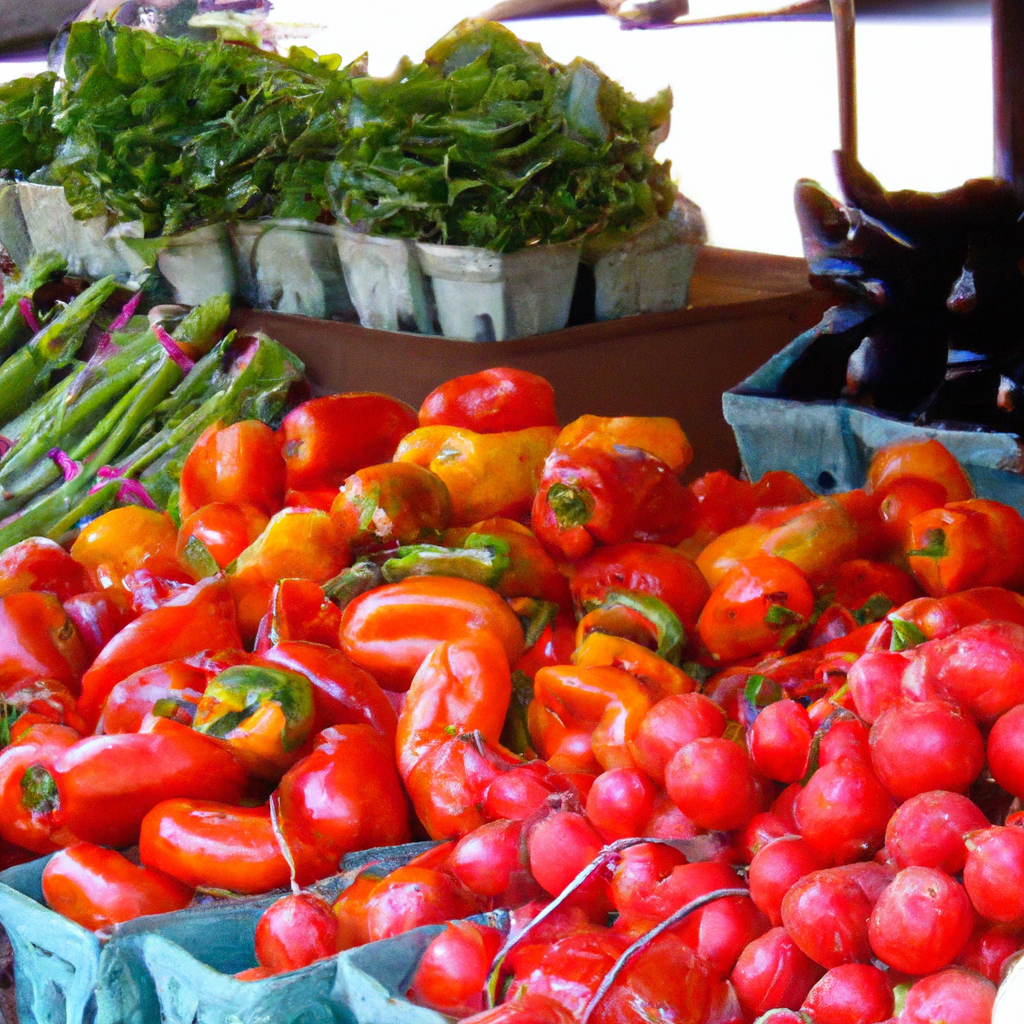Have you ever wondered if there are any local farmers’ markets or craft fairs in your area? Well, look no further! In this article, we will uncover all the hidden gems that your neighborhood has to offer – from fresh produce to handmade crafts. Get ready to explore the vibrant and diverse world of local markets, and find out how you can support your community while indulging in some delicious treats. So, grab your shopping bags and let’s embark on a journey of discovery together!

Benefits of Shopping at Local Farmers’ Markets
Supporting local farmers and the local economy
When you choose to shop at local farmers’ markets, you are directly supporting the hardworking farmers in your community. By purchasing their produce and products, you are helping them sustain their livelihoods and keep their farms in operation. This helps to bolster the local economy, as the money you spend stays within the community, creating a ripple effect of economic growth.
Access to fresh and seasonal produce
One of the main benefits of shopping at local farmers’ markets is the access to fresh and seasonal produce. Unlike grocery stores, where produce may have traveled long distances and sat on shelves for days, the fruits, vegetables, and other goods at farmers’ markets are often harvested just hours before they are brought to market. This means you can enjoy the peak flavor, nutritional value, and freshness of the produce, enhancing your culinary experiences.
Reduced carbon footprint
By shopping at local farmers’ markets, you are also reducing your carbon footprint. The majority of grocery store produce is transported long distances, often from different states or even countries, which requires significant energy and emits greenhouse gases. In contrast, when you buy locally, the distance between the farm and the market is minimized, resulting in fewer emissions. Supporting local agriculture contributes to a more sustainable and environmentally-friendly food system.
Opportunity to learn about farming and sustainable practices
Farmers’ markets provide a unique opportunity for you to learn about farming and sustainable practices firsthand. Many farmers and vendors are passionate about sharing their knowledge and insights into their farming methods, such as organic or regenerative agriculture. Engaging in conversations with these individuals allows you to deepen your understanding of where your food comes from and the environmental impacts of different farming practices. This knowledge empowers you to make more informed choices in your own shopping and consumption habits.
Finding Farmers’ Markets in Your Area
Online directories and websites
When searching for farmers’ markets in your area, online directories and websites can be invaluable resources. Local government websites, agricultural extension offices, and nonprofit organizations often maintain comprehensive lists of farmers’ markets, providing details such as location, operating hours, and featured vendors. Additionally, popular online platforms like Yelp and Google Maps allow users to search for farmers’ markets and read reviews from fellow shoppers.
Social media and community groups
Another effective way to find farmers’ markets in your area is by tapping into social media and community groups. Platforms like Facebook and Instagram are often used by farmers’ markets to promote their events and connect with customers. Joining local community groups or following agriculture-related accounts on social media can keep you updated on upcoming markets and provide a platform for asking for recommendations or sharing experiences.
Local newspapers and magazines
Local newspapers and magazines frequently feature articles and event listings highlighting farmers’ markets. These publications may have dedicated sections or columns that focus on local agriculture and food, making them a valuable source of information. Keep an eye out for community newsletters, lifestyle magazines, or dedicated agricultural publications that provide insights into the farmers’ markets in your area.
Asking neighbors and friends
Sometimes, the best way to discover local farmers’ markets is simply by asking your neighbors and friends. They may have firsthand experience with markets in the area and can provide valuable recommendations. Engaging in conversations about local food and farming with people you know can not only lead you to hidden gems but also help foster a sense of community and shared experiences.
Visiting the local tourism office
If all else fails, visiting your local tourism office is a great way to find farmers’ markets in your area. Tourism offices often maintain comprehensive information about local attractions, events, and points of interest, including farmers’ markets. The staff can provide you with brochures, maps, and other materials that will help you navigate the local food scene and ensure you don’t miss out on any exciting markets.

Factors to Consider When Choosing a Farmers’ Market
Location and accessibility
When choosing a farmers’ market, it’s important to consider its location and accessibility. Look for markets that are convenient for you to reach, whether by car, public transportation, walking, or cycling. Consider factors such as distance, parking availability, and ease of access, as this will determine your ability to visit the market regularly.
Operating days and hours
Another crucial factor to consider is the operating days and hours of the farmers’ market. Some markets operate only on specific days of the week, while others may have extended hours or operate year-round. Assess your own schedule and availability to ensure that the market you choose aligns with your lifestyle and allows you to make frequent visits.
Variety of vendors and products
The variety of vendors and products available at a farmers’ market is an important consideration. Look for markets that showcase a diverse range of farmers, artisans, and food producers. The more vendors present, the greater the selection of products you will have to choose from. A mix of fruits, vegetables, meat, dairy, baked goods, and crafts can provide a well-rounded shopping experience.
Quality and freshness of produce
One of the primary reasons to shop at farmers’ markets is the assurance of high-quality and fresh produce. When choosing a market, pay attention to the overall freshness and appearance of the products offered. Look for vibrant colors, signs of proper storage and handling, and ask vendors about their farming practices. This will ensure that you are purchasing the best possible products.
Community atmosphere and activities
The community atmosphere and activities at a farmers’ market can greatly enhance your shopping experience. Look for markets that foster a welcoming and vibrant ambiance, with live music, entertainment, and family-friendly activities. A positive atmosphere not only makes shopping more enjoyable but also encourages community engagement and social interactions.
Preparation Before Visiting a Farmers’ Market
Bring reusable bags or baskets
To be prepared for your farmers’ market visit, remember to bring reusable bags or baskets. Farmers’ markets often discourage or prohibit the use of single-use plastic bags, so having your own bags will ensure that you can easily carry your purchases. Consider bringing a mix of different-sized bags to accommodate various items.
Carry enough cash and small change
While many farmers’ markets now accept credit or debit cards, it’s still a good idea to carry enough cash and small change. Some vendors may prefer or require cash payments, and having the right change can make transactions smoother and more efficient. Additionally, using cash helps support the local economy by directly infusing money into the community.
Make a shopping list or meal plan
To make the most of your farmers’ market visit, consider making a shopping list or meal plan beforehand. Assess what items you need or would like to purchase, and plan your meals accordingly. This will help you stay focused and organized while shopping, ensuring that you get everything you need and avoid impulse purchases.
Check for any specific market rules or restrictions
Before heading to the farmers’ market, it’s a good idea to check for any specific rules or restrictions that may apply. Some markets may have guidelines on pets, smoking, sampling, or eating in designated areas. Familiarizing yourself with these rules ensures that you have a pleasant experience and adhere to the market’s guidelines.
Consider bringing your own water bottle and snacks
As shopping at farmers’ markets can be an enjoyable and lengthy experience, it’s important to stay hydrated and energized. Consider bringing your own reusable water bottle and snacks, especially if you plan on spending several hours exploring the market. This will keep you refreshed and satiated, allowing you to fully enjoy your time.

Exploring the Farmers’ Market
Take your time to stroll and explore
When you arrive at a farmers’ market, take your time to stroll and explore. Farmers’ markets are not meant to be rushed through, but rather enjoyed at a leisurely pace. Slow down, soak in the vibrant atmosphere, and let your senses guide you. This will allow you to fully appreciate the abundance of fresh produce, crafts, and local goods that are on display.
Engage with the farmers and vendors
One of the unique aspects of shopping at farmers’ markets is the opportunity to engage with the farmers and vendors themselves. Strike up conversations, ask questions, and show genuine interest in their products and practices. This not only deepens your understanding of their work but also builds connections and fosters a sense of community.
Ask questions about farming practices
Farmers’ markets provide an ideal platform for learning about different farming practices. Don’t hesitate to ask the vendors about their farming methods, such as whether they use organic practices, integrated pest management, or regenerative agriculture. This allows you to make informed choices based on your values and may even inspire you to try new and environmentally-friendly approaches in your own garden.
Sample and taste the produce
One of the joys of visiting a farmers’ market is the opportunity to sample and taste the produce on offer. Many vendors are happy to provide small samples, allowing you to experience the flavors and textures before making a purchase. Take advantage of this chance to explore new flavors, discover unique varieties, and find your personal favorites.
Support local artisans and craft vendors
Farmers’ markets often showcase more than just food. They also bring together local artisans and craft vendors who offer an array of handmade products. Take the time to browse through their creations, which may include items such as jewelry, ceramics, textiles, or natural skincare products. Supporting these artisans not only allows you to bring home unique, one-of-a-kind treasures but also contributes to the vibrant local arts and crafts scene.
Making the Most of Your Farmers’ Market Experience
Try new and unfamiliar produce
One of the exciting aspects of shopping at farmers’ markets is the opportunity to try new and unfamiliar produce. While you may be accustomed to purchasing the same fruits and vegetables from grocery stores, farmers’ markets often offer a wider variety of seasonal produce. Be open to trying new flavors, textures, and types of produce that you may not have encountered before. This expands your culinary repertoire and supports farmers who grow unique or heirloom varieties.
Buy in bulk for preserving and stockpiling
Farmers’ markets are excellent places to source fresh ingredients for preserving and stockpiling. Many vendors offer bulk discounts or wholesale prices for larger quantities of produce. This is particularly beneficial when certain fruits or vegetables are in season and abundant. Consider purchasing extra quantities of items you enjoy and use canning, freezing, or drying techniques to preserve them for later use.
Take advantage of discounted prices
Farmers’ markets often provide opportunities for you to enjoy discounted prices on produce and goods. Towards the end of market days, vendors may offer promotional deals or discounts on their remaining stock. This is a great time to score some bargains and stock up on items you regularly use. Keep an eye out for signs and inquire with vendors about any special offers or discounts available.
Build relationships with the farmers and vendors
Developing relationships with the farmers and vendors adds an extra layer of richness and personal connection to your farmers’ market experience. Frequent the same vendors, appreciate their dedication to their craft, and support the livelihoods of these hardworking individuals. Over time, you may find that they remember your preferences and even provide personalized recommendations or special deals to show their appreciation.
Attend workshops or cooking demonstrations
Many farmers’ markets organize workshops, cooking demonstrations, or guest speaker events that are open to the public. These activities provide valuable opportunities to learn new cooking techniques, gain insights into the local food system, and connect with like-minded individuals. Keep an eye on the market’s event calendar or inquire with vendors or market organizers to find out about any upcoming educational activities.

Exploring Additional Offerings at Farmers’ Markets
Local food trucks and vendors
Farmers’ markets often attract an array of local food trucks and vendors, offering a diverse selection of prepared foods and culinary delights. Take the opportunity to explore these offerings and indulge in some delicious treats. Whether you’re in the mood for a freshly-baked pastry, gourmet sandwiches, ethnic cuisine, or decadent desserts, you’re likely to find something to satisfy your cravings.
Live music and entertainment
To enhance your farmers’ market experience, many markets feature live music or entertainment. Take a moment to relax and enjoy the performances while savoring your purchases. The lively atmosphere created by the sounds of local musicians and performers adds to the overall ambiance of the market and creates an enjoyable and festive environment.
Pet-friendly and family-friendly activities
For those who enjoy bringing their furry friends or have children to entertain, some farmers’ markets offer pet-friendly and family-friendly activities. Some markets provide designated spaces for pets, pet-related vendors, or even host pet shows or contests. Similarly, family-friendly activities such as face painting, balloon twisting, or storytelling can keep children engaged and create a wholesome experience for the whole family.
Artisanal products and handmade crafts
In addition to fresh produce and food, farmers’ markets often showcase an array of artisanal products and handmade crafts. Take the time to peruse these offerings, which may include items such as handmade soaps, candles, woodworking, or beautiful artwork. By supporting these local artisans, you contribute to the thriving artistic community and bring home unique and meaningful creations.
Supporting local non-profit organizations
Farmers’ markets are not only about buying and selling goods. They also serve as platforms for local non-profit organizations to raise awareness and funds for their causes. Look for booths or stalls dedicated to promoting social or environmental initiatives. By engaging with these organizations and making a donation or purchase, you can contribute to the betterment of your community and support meaningful causes.
Tips for Shopping at Farmers’ Markets
Go early for the best selection
If you’re aiming for the best selection of produce and products, it’s wise to arrive early at the farmers’ market. Many vendors offer limited quantities of their most popular items, and arriving early ensures that you have a wider range of options to choose from. Additionally, you can avoid larger crowds and have more time to enjoy the market at a leisurely pace.
Bring a cooler or insulated bag for perishable items
To keep perishable items fresh and prevent spoilage, it’s a good idea to bring a cooler or insulated bag to the farmers’ market. This is especially important if you plan on buying items like meat, dairy products, or delicate fruits and vegetables. Keeping these items at an appropriate temperature on the journey home will maintain their quality and freshness.
Compare prices and quality before making a purchase
While farmers’ markets offer an incredible selection of fresh produce and products, it’s always a good idea to compare prices and quality before making a purchase. Take the time to visit different vendors and assess the prices and overall quality of their offerings. This allows you to make well-informed choices and ensures that you are getting the best value for your money.
Be open to negotiation with vendors
At farmers’ markets, there is often room for negotiation when it comes to pricing. While not all vendors may be open to haggling, some may offer flexible pricing, especially towards the end of the market day when they want to sell remaining stock. Politely inquire if there is any room for negotiation, and you may be pleasantly surprised at the discounts you can obtain.
Engage in small talk and build connections
Farmers’ markets are not only about shopping but also about building connections with the people behind the products. Engaging in small talk and expressing genuine interest in the vendors’ work can lead to meaningful conversations and connections. These interactions not only make your farmers’ market experience more enjoyable but also create a sense of community and shared support.

Year-Round and Seasonal Farmers’ Markets
Understanding the benefits of year-round markets
Year-round farmers’ markets offer a multitude of benefits compared to seasonal markets. By operating throughout the year, these markets provide stability for farmers, giving them a consistent avenue to sell their produce. This stability is essential for supporting local agriculture and ensuring the economic viability of farms. Additionally, year-round markets allow consumers to have access to fresh, locally grown produce even during the off-season.
Seasonal availability of different produce
Seasonal farmers’ markets, on the other hand, focus on providing produce that is in season. This means you can find an abundance of certain fruits, vegetables, and herbs during specific times of the year. Seasonal markets celebrate the natural cycles of agriculture, showcasing the best that each season has to offer. Shopping at these markets allows you to connect with the rhythms of nature and enjoy the peak flavors of seasonal produce.
Supporting farmers during off-peak seasons
Year-round markets play a crucial role in supporting farmers during off-peak seasons. While local agriculture flourishes during the warmer months, winter and early spring can pose challenges. By shopping at year-round markets, you can continue to support farmers during these leaner times. This support can make a significant difference in their ability to sustain their operations and maintain their livelihoods year-round.
Indoor and covered markets during colder months
In regions with harsh winter climates, some farmers’ markets move indoors or operate in covered spaces during the colder months. These indoor markets provide shelter from the elements while offering a varied selection of produce, baked goods, and other farm products. Shopping at these markets during the winter not only allows you to enjoy fresh and local food but also provides a cozy and inviting atmosphere.
Special holiday-themed markets
During holidays, farmers’ markets often host special events or themed markets. These holiday-themed markets provide an opportunity to indulge in festive flavors, find unique gifts, and experience a lively and cheerful atmosphere. Holiday markets are often adorned with decorations, offer seasonal treats, and may even host activities like caroling or visits from Santa Claus. Exploring these markets can add a touch of magic and joy to your holiday celebrations.
Community and Social Impact of Farmers’ Markets
Strengthening the local food system
Farmers’ markets play a vital role in strengthening the local food system. By providing a direct connection between farmers and consumers, these markets shorten the food supply chain and reduce reliance on large-scale industrial agriculture. This strengthens local food networks and encourages a shift towards sustainable practices, such as organic farming, regenerative agriculture, and supporting heirloom varieties.
Promoting health and wellness
Shopping at farmers’ markets promotes health and wellness on multiple levels. Firstly, the fresh and seasonal produce available at these markets is often higher in nutritional value compared to mass-produced counterparts found in grocery stores. Secondly, supporting local farmers encourages the use of sustainable and chemical-free farming methods, which can positively impact your health and the environment. Finally, the lively and community-oriented atmosphere of farmers’ markets contributes to overall well-being by fostering social connections and a sense of belonging.
Encouraging sustainable practices
Farmers’ markets are at the forefront of promoting and encouraging sustainable practices. Many of the farmers and vendors adhere to environmentally-friendly farming methods, such as organic, biodynamic, or permaculture techniques. By purchasing from these vendors, you actively support the use of sustainable practices that prioritize soil health, biodiversity, and long-term environmental resilience.
Fostering community engagement
One of the most significant social benefits of farmers’ markets is their ability to foster community engagement. These markets serve as gathering places where people from diverse backgrounds come together to celebrate local food, culture, and artistry. The opportunity to engage with farmers, vendors, and fellow shoppers creates a sense of community and shared purpose, enhancing social connections and strengthening the fabric of the local community.
Enhancing food security and access
Farmers’ markets contribute to enhancing food security and access within communities. By supporting local farmers, these markets help ensure a sustainable and secure food supply. Additionally, farmers’ markets often accept SNAP (Supplemental Nutrition Assistance Program) benefits, making fresh and nutritious food more accessible to low-income individuals and families. This promotes equity and inclusivity within the local food system, ensuring that everyone has the opportunity to enjoy wholesome and nourishing food.
In conclusion, shopping at local farmers’ markets offers a wide range of benefits that extend beyond the act of purchasing fresh produce. By supporting local farmers and the local economy, you contribute to the growth and vitality of your community. The access to fresh and seasonal produce not only enhances your culinary experiences but also improves your health and wellness. Shopping at farmers’ markets reduces your carbon footprint and supports sustainable farming practices, fostering a more environmentally-conscious food system. Additionally, farmers’ markets provide a unique opportunity to learn about farming, engage with vendors, and build connections with the people who grow your food. So, take advantage of the numerous farmers’ markets in your area, discover the diverse offerings, and immerse yourself in the vibrant atmosphere of these community hubs. Happy shopping!

